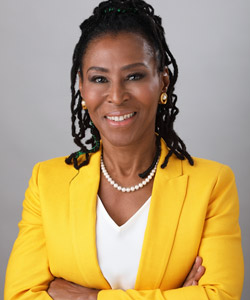By Sarah Russo

Sarah Russo is a writer, cannabis consultant, and a social media and content manager. She got her degree in environmental studies and social justice, with a focus in plant medicine from the Evergreen State College. She has previously worked for Project CBD and the Society of Cannabis Clinicians. She has also acted as an herbal medicine educator in natural remedy apothecary shops. Some of her main goals are diversifying the cannabis movement by integrating the plant into the greater herbal medicine compendium as well as encouraging sustainable agricultural practices.
Meet the Experts is a series of interviews conducted by experts from the field of Cannabis to world leaders in research and clinical practice of Cannabis as medicine.

Dr. Genester Wilson-King, MD, is a Board-Certified obstetrician and gynecologist and Fellow of
the American College of OB/Gyn with over 25 years of clinical experience providing
compassionate, individualized, and research-driven care to patients throughout Florida.
After years of working as a full-service OB/GYN in established institutions such as Lawnwood Regional Medical Center and Florida Hospital Waterman, she founded Victory Rejuvenation Center (VRC), a private holistic and preventive medicine practice that provides life-transforming management modalities and customized medicines prescribed to improve and advance the health of men and women. As the Medical Director of VRC, she channels her expertise in plant-based medicine, integrated health, nutrition and supplement use, exercise, cannabis education and hormone balancing to provide services that help her patients age gracefully and achieve holistic well-being.
Dr. Wilson-King is also an advocate, speaker, clinician and educator for cannabis and hormone/wellness therapy. She presents on Cannabis use in Obstetrics and Gynecology, hormone therapy for PMS, Perimenopause, Menopause and Postmenopause and is nationally recognized.
Dr. Wilson-King is a Fellow of the American College of Obstetrics and Gynecologists, and a Diplomate of the American Board of Obstetrics and Gynecology. Dr. Wilson-King completed her internship and residency at Thomas Jefferson University Hospital and has degrees from Swarthmore College and Thomas Jefferson Medical College.
Dr. Wilson-King treats people from the perspective that we are a spirit with a soul held within a body. In order to achieve health and wellness, you must nourish and nurture all three.
Sarah Russo: What inspired you to begin doing cannabis consultations in your clinical practice?
Genester Wilson-King: I have been practicing in an integrative wellness practice for more than 10 years. Initially, I treated women because of my background as an obstetrician and gynecologist, but now I work with everyone. The women brought in their husbands because they "couldn't keep up with their wives".
I assess where people are and help them to get where they want to be on the health and wellness spectrum. As far as what got me into cannabis, I read a Lester Grinspoon's book Marihuana the Forbidden Medicine. His chapter on aging was especially impactful. Cannabis seemed to fit right into my practice.
I have been studying cannabis as a medicine since 2005. I began reading, researching, traveling to states with medical cannabis programs, and learning from other cannabis-friendly physicians. I joined the Society of Cannabis Clinicians in 2014. They have an excellent CME program from which I learned many of the basics. I became a cannabis educator that same year. When medical cannabis was legalized in my state in 2016, I became a cannabis clinician.
SR: You conducted a study with Stanford Medical School examining the influence of cannabis on sexual and reproductive health. Can you explain a bit about it and how it can contribute to our understanding of cannabis research?
GW-K: There is a lot of talk about using cannabis for wellness. There are four tenets through which wellness can be assessed. They include sleep, pain, stress/anxiety/depression and sexual health. We found that sexual health had the least amount of research on it, and it was a natural extension to previous studies.
In late 2018, I was approached by Dr. Michael Eisenberg, the head of the Department of Urology at Stanford Medical School. Dr. Eisenberg had published two studies involving surveys on cannabis for sexual and reproductive health. The first was titled "Association Between Marijuana Use and Sexual Frequency in the United States: A Population-Based Study" published in 2017. It concluded there was a positive association between cannabis use and sexual frequency in men and women across all demographic groups. Although reassuring, the effects of cannabis use on sexual function warrant further study.
The second study by Dr. Eisenberg from 2018, titled "Association between use of marijuana and time to pregnancy in men and women: findings from the National Survey of Family Growth", a retrospective review of cross-sectional survey data from respondents (aged 15-44 years) who participated in the first study. The study demonstrated that there was no statistically significant impact of cannabis use on the time to conceive a baby. This study suggests that neither cannabis use nor frequency of use was associated with the time it took for a couple to become pregnant.
We decided that the next step was to delve into more specific information about the types of cannabis chemovar, the frequency, the route of administration, AND to incorporate a known used tool to screen for sexual dysfunction in men and women and see if there are any associations to be made. It took us about 6-8 months to get it all together. Both questionnaires have been developed as a self-reporting instrument for assessing the key dimensions of sexual function and are widely used in practice. The survey took around 10 minutes to complete. The study was approved by the Institutional Review Board (IRB) at the Stanford University School of Medicine and is in compliance with the privacy protections provided by HIPAA. It is all anonymous.
The questions for women are based on the "Female Sexual Function Index" (FSFI). It provides scores on six domains including desire, arousal, lubrication, orgasm, satisfaction, and pain. The male questionnaire is based on the "International Index of Erectile Function" (IIEF). The questions ask about erection problems and whether there has been an effect on their sex lives within the past four weeks. The survey also accommodates a variety of sexual orientations. We'd love the survey to get out to a diverse array of folks that may not have had the opportunity to be involved in research.
SR: How can cannabis be of specific benefit for issues affecting women?
GW-K: Historically, cannabis has been used for many different gynecological conditions. Dr. Ethan Russo wrote a landmark paper on the Cannabis Treatments in Obstetrics and Gynecology. In it he described cannabis use in the treatment of menstrual irregularity, miscarriage, childbirth, urinary frequency and retention, menopausal symptoms, decreased libido, and more.
Cannabis is helpful in improving stress, anxiety, and depression in premenstrual syndrome, perimenopause and menopause. In my practice, I have seen patients that are being treated for a qualifying condition and they tell me other conditions and symptoms the treatment regimen has helped. For example, women being treated for PTSD talk about how cannabis has relieved their dysmenorrhea or pelvic pain. How their PMS and other hormonally mediated conditions are better since they began cannabis. Most hormonal conditions in women are managed much better with hormone replacement. However, there are many women in whom hormone therapy is contraindicated or who are simply not interested in hormone therapy.
SR: How does cannabis fit into a nutritional approach to health and wellness?
GW-K: Is cannabis a superfood? Many people consider it as such. It is a dark, leafy green. We do not know the exact nutritional profile of cannabis, but think about all you can do with the plant. One can use every part of this plant from the root to the leaves for food or textiles, including the flowers and the stem/stalk!
Cannabis can be consumed raw or in its activated (decarboxylated, ie heated) form. Both ways offer therapeutic benefits. The most common and oldest way of ingesting cannabis is smoking. In fact, much of the literature espousing the benefits of cannabis is based on smoking cannabis. Though smoking is not the healthiest form of ingestion, it is effective. Inhaling cannabis via a vaporizer (such as a Volcano) is probably the safest form of ingesting cannabis.
Edibles can also be safer than smoking, but provide a different set of parameters. Ingesting cannabis orally has a different effect on the body. The delta-9-THC is metabolized by the liver to 11-Hydroxy-THC, which is a more potent form that can last several hours. This is beneficial to many people treating severe chronic diseases. However, one must be careful of edibles due to the sugar and other unhealthy ingredients often used.
According to Francis Young, an Administrative Law judge working on the first lawsuit to remove cannabis from Schedule 1 in the US, cannabis is far safer than many foods that are commonly eaten. He said, "Marijuana in its natural form is one of the safest therapeutically active substances known to man."
Ingesting raw cannabis is a viable option. The acid forms of cannabis, THCA, CBDA, CBGA, are showing tremendous promise with respect to helping disease. The benefits and physiologic impacts of cannabis in its raw form are currently being elucidated in the literature, mostly preclinical studies.
Cannabis smoothies and cannabis juicing are both very popular methods of cannabis ingestion. Besides the therapeutic benefits gleaned from cannabis, there are nutritional benefits as well. With so much negative attention being placed on the psychoactive aspects of cannabis, the real power behind the plant is being lost. Forget your ten different kinds of supplements. You can get most everything you need from cannabis.
SR: What is the role of the ECS on hormone function? How can this affect different genders in unique ways?
GW-K: This is a highly complex topic. But the basics include the ability of cannabis to affect multiple endocrine systems. Cannabis can suppress reproductive hormones, prolactin, growth hormone, and the thyroid. These effects are mediated through CB1 receptor activation of the hypothalamus. However, any effects seem to be lost with chronic use and the development of tolerance.
Studies in humans have had inconsistent results that may reflect differences in study design, where you are in the menstrual cycle, or the development of tolerance. Long term effects on the various endocrine systems have not been clearly demonstrated. Clinical consequences, if present, are likely to be subtle.
Let me give you one example: cannabis has been shown to disrupt the normal ovulatory cycle and hormonal secretion in both animals and humans. Similar findings in males and females show that tolerance may develop over time and the consequences of chronic use have not been firmly established. In a study by Ziva Cooper and Rebecca Craft, cannabis has been shown to decrease testosterone levels in men. It can affect the hormonal milieu of the menstrual cycle, but with tolerance these effects appear to no longer exist.
THC indirectly decreases the secretion of GnRH by the hypothalamus through regulation of the neurotransmitters glutamate and gamma-aminobutyric acid (GABA) and via the transduction of dopamine. In women, THC inhibits the maturation of the ovarian follicle and ovulation. During ovulation, the body releases a surge of endocannabinoids to the ovary. Excess cannabinoids from cannabis consumption can disrupt the ovulatory surge and lead to an irregular cycle. THC also inhibits steroidogenesis by preventing the conversion of pregnenolone to progesterone.
In men, THC has been shown to decrease sperm count and motility, reduce serum testosterone, and inhibit the processes needed to facilitate sperms' ability to achieve conception. These effects can lead to decreased fertility in both men and women, but fertility can return with cessation of use. On the other hand, a study conducted by D. Michael Eisenberg at Stanford Medical College in 2018 showed no difference in time to pregnancy between cannabis users and non cannabis users. There were a total of 758 male and 1,076 female participants.
In summary, chronic cannabis consumption can have effects on the adrenal, thyroid, and reproductive systems. This can potentially affect energy, behavior, and reproductive health. Fortunately, after stopping long-term, chronic use, the body can restore normal function, hopefully mitigating these effects. THC also has an impact on the developing fetus so stopping cannabis use while trying to conceive will help both you and your developing child.
SR: Do you feel like the medical community is opening up to the use of cannabis or is there still a stigma?
GW-K: More and more physicians are becoming recommending physicians. There are around 2,600 physicians in Florida that are recommending cannabis. But the total number of active and licensed physicians in the state is approximately 67,000. So we have a long way to go. It's a process for sure. That is why the Society of Cannabis Clinicians is an important part of the cannabis community. We offer physician education that helps people get started.
The "stigma" shifts as physicians see their patients improve using cannabis as opposed to the conventional meds they have been prescribed for years. Physicians have families and friends with various diseases and conditions that have been helped with cannabis.
SR: What do you feel are some of the biggest limitations patients face to accessing the cannabis medicine they need?
GW-K: There are three main obstacles:
- Cost: Cannabis products can be very expensive and cause many patients to stay underground and use unregulated, untested medicine.
- Access: Some places forbid dispensaries even in states where there is a medical or recreational cannabis law on the books. And even if people can visit a dispensary, there is an issue with the consistent availability of medicine. Dispensaries in some areas have difficulty keeping products on the shelves.
- Overregulation: Many states with medical cannabis laws on the books limit the number of diagnoses patients can use to get a medical card. For example, chronic pain is the diagnosis that over 90% of patients use to gain access to cannabis. Some states do not even allow chronic pain as a qualifying condition. The National Academy of Science Engineering and Medicine concluded (after a review of over 10,000 studies) there is substantial evidence that cannabis is effective for chronic pain in adults.
SR: How can access to cannabis specifically empower folks who may not have had the chance to use it before?
GW-K: No matter the color, religious affiliation, or sexual orientation, or gender, we all deserve to be well. What does being well mean? It means the ability to be a productive and contributing member of society, and to enjoy a certain quality of life fit for all members of society. The actual state of wellness means feeling no to minimal pain in our bodies, getting a good nights' rest every night (or most), minimal stress, anxiety and depression, and a healthy sex life. It is very difficult to live in this society as a person of color, especially males.
People of low income usually suffer from all of the above. Allowing people access to cannabis can improve health and allow them to feel like they can be contributing members of society.
The cannabis industry has, for the most part, excluded people of color. One of the qualifications to participate in the industry is the ability to pass a background check. Because black and brown people are disproportionately targeted for the possession of cannabis, many are unable to pass a background check.
Women are often excluded for many of the same reasons minorities are excluded; economics, and old boys club mentality. One of the common myths is that "women are an emerging market segment of new cannabis consumers." The reality is that women already use cannabis as frequently as men. However, there is a key differentiator: women use cannabis for different reasons. For example, when it comes to how many people use cannabis to aid with sleep, women outnumbered men, 68 percent to 58 percent. Women are more likely to consume cannabis before bed.
A fully mature cannabis market will need to address men and women in equal measure. But it can and likely will evolve in unique ways in order to address the differing needs and desires of each sex. Understanding and utilizing cannabis can be a major breakthrough in helping to handle chronic disease for everyone.


